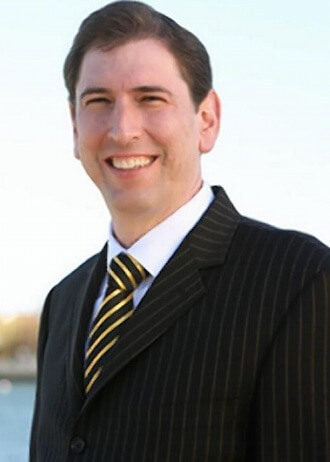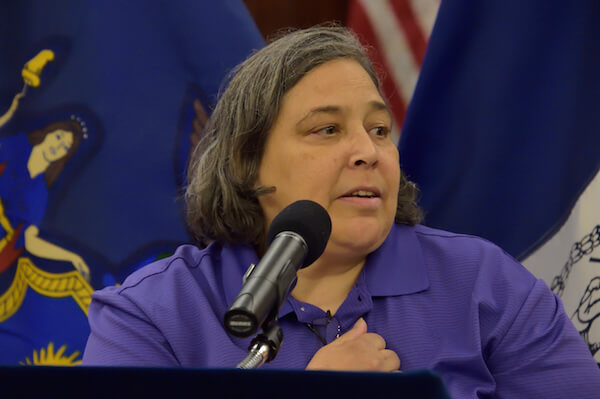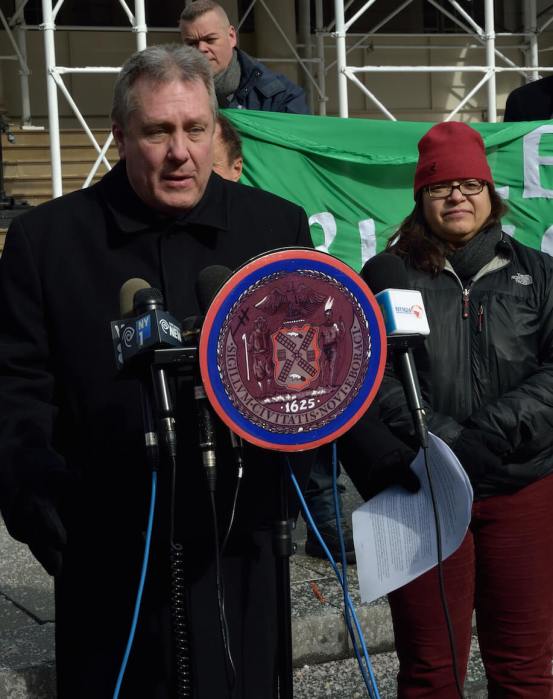Homeless LGBT youth, for all the challenges they face, are beginning to organize as never before, in recent years learning about lobbying for the services and housing they need by dramatizing their plight and enlisting allies in their cause.
And through the good work of the Theater of the Oppressed NYC, drama is quite literally playing a big role in improving their skills and confidence. TONYC has created an ensemble of young people drawn from existing programs they conduct with LGBT homeless youth services groups such as the Ali Forney Center, the Hetrick-Martin Institute, and the Door. This mega-ensemble recently completed a weekend workshop.
TONYC partnered for the first time with St. Luke’s in the Field, an Episcopal church at the corner of Hudson and Christopher Streets. Katy Rubin, TONYC’s founder and director, explained that the actors have experienced homelessness and are the creators of their playlet.
“They design it, they direct it to demonstrate a current problem, but one that comes from their own experience,” she explained.
The May 17 weekend of “Legislative Theater” in the church’s gym was organized to share information and create strategies for action. It is advocacy by storytelling.
It is one thing to be aware of the often desperate conditions facing these youth and quite another to watch them portray a police stop where the officers go through a young person’s belongings and casually throw condoms on the street. For these youth, a legislative proposal to ban the use of condoms as evidence of prostitution is a battle to protect a basic human right for access to preventive health care. Many of these youngsters challenge gender stereotypes and some have been charged with being sex workers with or without cause.
The youngsters play all the parts. They are the ones being stopped, and they are the actors playing the police officers. They wrote the mini-play with the assistance of the staff of TONYC.
“The performance gives audiences a chance to feel solidarity,” Rubin said. “Earlier presentations left audiences riled up and wanting to know what to do next.”
The weekend also fostered self-esteem and self-empowerment.
“Being on stage is a powerful experience,” Rubin explained. “They make an audience laugh and create feelings of empathy.”
TONYS’ model is part of an international movement for empowering disenfranchised people that originated in Brazil and has spread to 70 countries.
The stories that youth decide to tell may be prompted by TONYC staff asking questions like, “When did you experience discrimination and were denied what you consider a basic human right?” Framing the issues in this way links the youth’s experiences to concepts of justice and provides alternative explanations that stop them from blaming themselves for their predicament or getting trapped in incoherent rage. TONYC prompts educational skills like reflection and analysis.
The young actors at St. Luke’s also portrayed youth seeking shelter as well as the social workers who recognize a need but are unable to provide services under their policy guidelines. In this way, the youth walk in the shoes of adults they encounter, many in adversarial ways. The actors examine their experiences from all angles, and their understanding of the hurdles they face grows.
At the end of the weekend, the participating youth remained keenly aware of the unmeet needs too often dominant in their lives, but they also exhibited a palpable sense of achievement. On Sunday afternoon, they enjoyed a cast party and also discussed the need for decisive government action to address their everyday reality.
The theater workshop drew the attention of several gay elected officials. West Side State Senator Brad Hoylman attended, as did a representative of Queens City Councilman Daniel Dromm. Councilman Jimmy Van Bramer, also of Queens, was there as well and said what he saw reminded him of his days in ACT UP.
Behind St. Luke’s brick walls are a park, a church, and a school. The church holds Saturday night dances for LGBT youth, and Rubin expressed satisfaction about the successful “networking” that brought TONYC and St. Luke’s into a closer working relationship. She predicted that as word spread that LGBT youth in need are welcome at the church socials, their attendance would increase.
The approach taken by St. Luke’s couldn’t be more starkly different from the hostile attitude with which the Catholic hierarchy and right-wing Protestant groups confront the LGBT community. During the “Legislative Theater” weekend, Reverend Mary Foulke gave a sermon commemorating Pentecost Sunday, the holiday that celebrates the arrival of the Holy Spirit among Christ’s apostles after his crucifixion — an event that inspired them to start the Christian Church.
Foulke told her congregation, “In the Sixth precinct (that is this neighborhood), recent statistics show that in the space of one year, 2,954 incidents of stop and frisk were reported. In 865 of those cases, officers reported the use of force.’
In only 32 of those stops was a weapon found. In addressing this issue, Foulke made clear that her church is prepared to provide leadership in forging solidarity in the community. St. Luke’s, by opening its doors to TONYC and the youth it serves, is also helping to arm young people with the capabilities and fortitude to take lessons from the stage beyond its walls and into the real world.

































